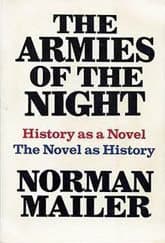The Armies of the Night
Critique • Quotes
 First edition
First editionSubtitle
History as a Novel, The Novel as History,
First publication
1968
Literature forms
Novel, memoir
Genres
Literary, journalism
Writing language
English
Author's country
United States
Length
Approx. 135,000 words
Now that new journalism is old
If you've heard that the highlight of 1967 was the Summer of Love, check out The Armies of the Night to discover the famous summer was followed by the Autumn of Confrontation. At least in the United States.
The growing protest against the Vietnam War was then merging with the "Make Love Not War" counterculture and swelling into a movement that would soon engulf America and much of the rest of the western world. In October 1967 a massive demonstration marched on the Pentagon in Washington. Norman Mailer was there and was arrested, and wrote this highly subjective, entertaining and occasionally enlightening account of his experience.
The book is subtitled somewhat pretentiously History as a Novel, The Novel as History, as if heralding a new art form. Or perhaps just another example of the "New Journalism" of the day giving itself airs.
When you read this work today, it seems quite dated. To wit, Mailer's observation of how the New Left (everything was called "new" then) took its aesthetic from revolutionary Cuba. And his descriptions of now-forgotten literary and political figures involved in the protests. Even Mailer's kaleidoscopic collision of insights into the war machine, the tactics of protest and the psyche of America seem somewhat overheated and naive now.
But others were impressed at the time, as the book won both the Pulitzer Prize and National Book Award in 1968.
Mailer at the front
The Armies of the Night really is two accounts of the same event: one subjective as narrated by a participant and one slightly more objective, based on third-party reports.
But if this is a "novel", it does have one intriguing central character—namely, Mailer. As usual, the author places himself front and centre. We keep reading, especially the highly subjective first half of the story, because we enjoy seeing everything through his eyes. We even enjoy the side trips into Mailer's own peccadilloes that have little to do with the protest movement he is supposedly reporting on. Critics may complain the writer is verbose and self-obsessed, but it is this main character with his avalanche of observations who makes it work at all.
Many other books published during that period and written by members of the "flower power" generation are virtually unreadable today. As part of an older generation, who nevertheless sympathized with the young people's cause, Mailer, the former soldier and author of one of the greatest fictional accounts of the Second World War twenty years earlier, had both the perspective and the passion to create one of the more interesting portraits of that time.
Whether The Armies of the Night will endure as a timeless work of art though is doubtful. But so what? Read it for a glimpse of the thinking of that time and its affect on the thinking of later times, both in agreement and opposition.
— Eric
Critique • Quotes

